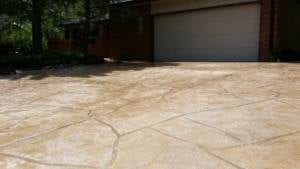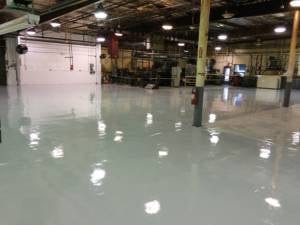When deciding on which sealer to use for your concrete floors, it is best to look at a few main differences between epoxy and acrylic sealers. There are pros and cons to each sealer in terms of the finished look, economics, downtime, and whether you should use it inside or outside. Many people refer to “stained concrete,” “epoxy floors,” “sealed concrete floors,” or even “polished concrete,” as a floor that has been ground smooth, possibly stained or applied with a topcoat of epoxy (usually clear but can be colored), polyurethane, polyaspartic coatings, or an acrylic sealer. Thus, this article will help you understand when it is best to use a coating, like an epoxy, or a water-based or solvent-based acrylic sealer.
Concrete floors are an amazing flooring solution. Not only are they a green flooring solution, they are also easy to maintain in high traffic areas and manufacturing facilities. They are best when sealed properly and with the highest performance products on the market, as well as if an experienced flooring contractor installs the system. Below is a summary of the differences between epoxy and acrylic sealers, as well as a brief explanation of each, and benefits of both systems, so that you can make an informed business decision on your next flooring project.
WHAT IS ACRYLIC SEALER?
Acrylic sealer comes in both water-based and solvent-based formulas and can be used to enhance the color and protect interior or exterior concrete surfaces. Acrylic sealer is applied in a thin film that protects the concrete from chloride and water, while also permitting moisture in the slab to escape. It is available in a variety of sheens and is low-cost, fast-drying solution.
 WHAT IS AN EPOXY COATING?
WHAT IS AN EPOXY COATING?
Epoxy coatings form a high-build, generally glossy, protective film on the concrete surface. They produce a hard, abrasion-resistant, long wearing surface. Epoxy coatings are available in clear or can be colored. They are water repellent, however, different than acrylic sealers they are non-porous and do not allow the trapped moisture to escape. Epoxy sealers are harder than acrylic sealers.
DIFFERENCES BETWEEN EPOXY AND ACRYLIC SEALERS:
Here is a chart you can quickly glance at to obtain the main differences between epoxy and acrylic sealers. Refer to the type of sealer or coating on the left-hand side of the chart and the subject, like finish, economics, and downtime, on the top of the chart.
| Type Of Sealer | Finish | Economics | Downtime | Types of Applications | Interior or Exterior Application |
|---|---|---|---|---|---|
| Epoxy Sealer | High gloss sheen | More expensive | More | • Food Manufacturing facilities • High traffic areas • Chemical containment areas |
Interior recommended |
| Acrylic Sealer | Variety of different sheens, Matte to glossy | Less expensive | Less | • Fast-paced projects because it dries to the touch within an hour • Exterior surfaces, like stamped concrete, to protect the concrete from ice melt, and from the color being worn away • Interior floors with stain to enhance and protect the color |
Interior or Exterior |
Now that you know more about epoxy coatings and acrylic sealers, you should be armed with the benefits and drawbacks of each system. Either is an excellent choice and will brighten up any room and protect the floor. It really depends on how much your budget is, how long you can allow for cure time, longevity of the sealant’s life, and for what you will be using the area. Although this is useful information, your concrete flooring contractor should best guide you on which system to use, based on the information you provide. We will be glad to meet with you and give you a plan or a couple options that will best make sense for your concrete flooring project.
Contact Us Today For Your Free Estimate
If you’re looking for concrete floor refinishing, concrete staining, epoxy coatings, concrete repair or other services, our team can provide high-quality, effective solutions for commercial and industrial companies in Denver, Colorado, and the surrounding areas.
Give us a call at (720) 835-1013, or fill out the form below to get started today!

